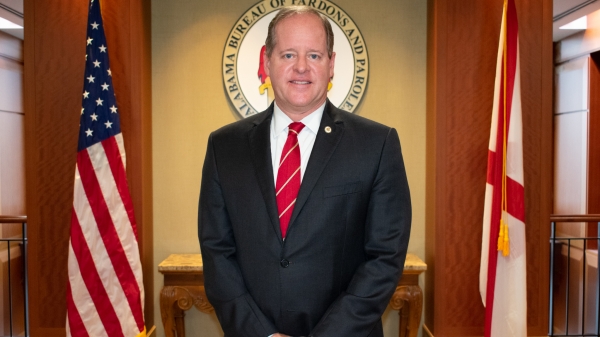Alabama is on track to grant the lowest percentage of parole in over a decade by only releasing just under 8 percent of people so far this year. APR spoke with the former chair of the Alabama Board of Pardons and Paroles, Lyn Head, to discuss what she believes are the reasons for the declining parole release rate in the state.
Also, the board currently only has two members instead of three following Kim Davidson’s departure. Davidson was appointed in March to serve out the remaining term of previous board member Dwayne Spurlock.
On August 8 and August 9 the parole board held 23 hearings for each separate day and denied all parole requests both days. According to monthly statistical data from March, the latest month available despite it being August, parole was granted at a rate of 2 percent that month despite the department’s recommended grant rate of 82 percent.
Head said the current situation and declining rate of parole goes back to the fall of 2018 when Attorney General Steve Marshall issued a warning to her and the rest of the board. Marshall told them that if they did not restructure the organization and fire the executive director at the time he would introduce legislation in 2019 that would restructure the organization.
There is a 2018 Capitol Journal interview where Marshall says he and Gov. Kay Ivey were prepared to pursue legislation to restructure the board to their liking.
“The governor and I are prepared to do what it takes to make sure we’recomfortable with the leadership that’s going on within that department,” Marshall said during the broadcast. “And if not I think we have the ability through legislative changes and other areas to be able to make sure that board has not only the trust of the governor and myself but the people of Alabama.”
The impetus for Marshall and Ivey’s demands was the 2017 parole of Jimmy Spencer who ultimately committed three murders in July of 2018. Because of Spencer’s crime Marshall wanted the board to oust the executive director but Head said she and the board voted against this because it would not have fixed the issues related to Spencer’s case.
With the board’s refusal that is when the legislation in 2019 was proposed and eventually passed leading to Marshall and Ivey taking over the parole board according to Head.
“And so they took over the agency through the governor’s appointment of an executive director which then was [Charles] Graddick and [Ivey’s] appointment of an assistant attorney general as the the board chairman.” is I won’t say the entire makeup because other board members have demonstrated desire to be trained as we were when I was there but they have not been given that opportunity. And I have heard that she’s made the comment that all that is a bunch of gibberish. That science that I was talking about before. The chairperson Gwathney says all of that is a bunch of gibberish.”
The assistant attorney general, from under Marshall, Head is referring to is Leigh Gwathney. Head said that prior to the 2019 legislation all parole board members had to undergo training for structured decision making and primarily followed the latest science-based guidelines and recommendations laid out by the Association of Paroling Authorities.
Head said these practices were arranged in 2015 legislation but are not being implemented like they were during her tenure. Head pointed much of the blame to Gwathney and how she views science-based guidelines for parole and training.
“I won’t say the entire makeup because other board members have demonstrated desire to be trained as we were when I was there but they have not been given that opportunity,” Head said. “And I have heard that she’s made the comment that all that is a bunch of gibberish. That science that I was talking about before. The chairperson Gwathney says all of that is a bunch of gibberish.”
Rep. Chris England, D-Tuscaloosa, told Alabama Daily News that he believed the declining parole rate was due to Gwathney.
“This is not a secret, I’ve said from the very beginning, as long as Leigh Gwathney is in place, you’re going to get the same results,” England told Alabama Daily News. “I’m not basing that on just my personal opinion; since the day Gwathney stepped in office, the board has been inconstant, it’s been ineffective, it’s been somewhat incompetent, and also the results can’t be relied upon. It could have 45 members; as long as she’s in charge, I wouldn’t expect anything different.”
Head said the current board only cares about the details of a crime the day it occurred despite how erroneous and faulty this information can often be. Head stated, “they are not letting people out when they are at low-risk,” or “progamming” or “criminally desistant.”
The refusal to grant parole only creates more trauma for both the incarcerated and their family members by creating a sense of hopelessness, Head said. And there is an immeasurable cost to taxpayers as well that would take a, “PH.D economist,” to calculate, according to Head.
“You’ve got the direct cost of yearly housing the prisoners,” Head said. “In addition, to the number of people that you’re multiplying that daily cost are also not in the public working, they’re not paying taxes so there’s that cost. Then, there is the additional cost that is spread to the family of every single incarcerated individual, because of the trauma that happens to them.”
Head also mentioned the economic consequences for families when having to pay to call their incarcerated loved ones.
“That’s a cost that a family could be spending on groceries or helping their neighbors.”
Head also stated that she resigned because of blatant, blatant, blantant racial discrimination” that occurred when Graddick took over as the Director of Pardons and Paroles.
“On the first day they walked in and gave termination papers to all three of our black Assistant Directors and Executive Directors , all three of the black people in management other than IT,” Head told APR.
Graddick was appointed in July 2019 after the legislation to restructure the organization passed the Legislature in May of 2019. Graddick would resign a year later in 2020, however, Head said he did immeasurable damage to the organization in his short tenure.
Since Head’s resignation and the restructuring of the parole board, the grant rate for parole has fallen from 53 percent in 2018 to now so far in 2023 less than 8 percent.





















































